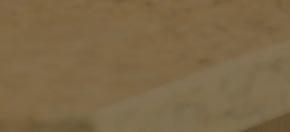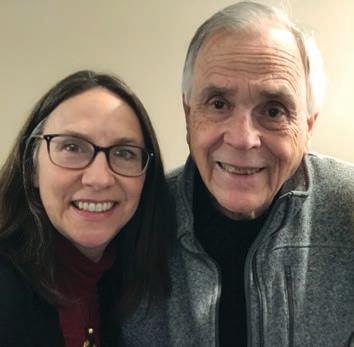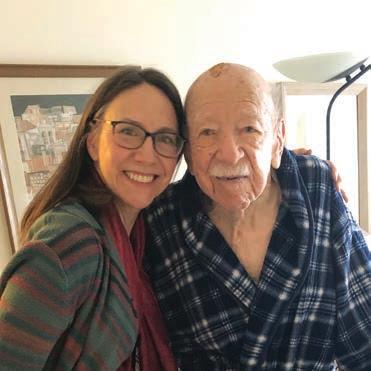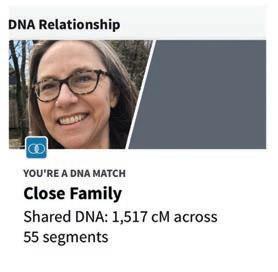
14 minute read
An Unknown Mishpachah
JEWSIN THED ON THE COVER
Longtime Jewish Detroit fertility doctor used his own sperm to inseminate patients, new DNA tests show.
Advertisement
MAYA GOLDMAN CONTRIBUTING WRITER
When sisters Lynn Neher and Jaime Hall, then Lynn and Jaime Brown, were growing up in a non-Jewish household in Bloomfield Hills in the 1960s, they thought of themselves as polar opposites.
Jaime had dark hair, pale skin and blue eyes. Lynn had blond hair, olive skin and green eyes. They had a running joke in the family that Jaime was the mailman’s daughter, Lynn told the Jewish News.
Jaime, of course, wasn’t the mailman’s daughter. But decades later, she and Lynn found out that they were, indeed, half-sisters. They’d both been conceived via artificial insemination at the Detroit practice of Dr. Philip Peven. Lynn’s sperm donor was then an intern at Grace Hospital. And Jaime’s biological father, as now suggested by DNA tests, was Dr. Peven himself.
“A BIT OF A SHOCK”
Jaime, 61, and Lynn, 63, began to question their true parentage in 2008, when their stepfather passed away and their stepsister decided to spill the family secret she’d promised to tell upon his death: Their dad wasn’t their biological father.
“I just said, ‘Yeah, right. Like, I believe that.’ I mean, just talk about utter shock after utter shock,” Lynn said.
A few weeks later, Jaime got in touch with Dr. Peven, who she said confirmed he’d helped their parents with fertility treatments. (Dr. Peven did not respond to multiple interview requests from the JN for this story, and his son Roger Peven declined to comment on his behalf.)
Dr. Peven told her that he didn’t have records of their births, but that he thought Lynn’s biological father had been a resident at the hospital. They often used interns or residents who looked like the dads as donors, Jaime says he told her on that first call. Jaime eventually got her mother to admit that Jaime’s donor had been a close family friend.
In 2015, Jaime and Lynn’s mother passed away. Lynn ordered an AncestryDNA testing kit, but it didn’t lead her to any information about her biological father. In 2018, she decided to provide a sample to 23andMe as well — soon, she learned of a half-sister.
She connected with the sister, who’d been raised by their shared father. The sister told Lynn that her dad had, in fact, worked as an intern at Grace Hospital around the time Lynn was born.
At this point, Jaime decided to do a DNA test as well. She’d already connected with the family of her supposed donor. She’d assumed her results would tell her she was nearly 100% Scottish. But that wasn’t what she found.
“To see that I was 50% Ashkenazi Jew was a bit of a shock!” Jaime said.
Through the other relatives who came up as close DNA matches on AncestryDNA and 23andMe, Jaime deduced that she was related to Dr. Peven in some way. When Dr. Peven’s grandson showed up on her platform as her nephew, she became more certain the doctor was her biological father. (Jaime shared her 23andMe results with the JN.)
Eventually, Jaime connected with Dr. Peven again. She said he told her that her mom had brought in her own donor sample, but that he threw it away and used his own because he knew it was “pure and viable.”
In her conversations with Dr. Peven, Jaime has come to think of him as a scientific man who was just trying to help families become whole. But she still wonders about the ethics of his actions.
“My mom would roll in her grave if she knew he was my father,” Jaime told JN. “She did not pick that.”
Jaime, who now lives in Traverse City, has so far connected with five other half-siblings assumed to be the biological children of Dr. Peven through artificial insemination. They’re spread out across the country, from Michigan to Oregon.
Dr. Peven, 104, delivered more than 9,000 babies during his career, some through artificial insemination. But according to his son, Roger Peven, he has not taken a DNA test himself to help verify how many biological children he has.
Detroit Medical Center, which today runs Sinai-Grace Hospital, declined to comment for this article.
GARY HOWE
A WELL-RESPECTED DOCTOR
Philip Peven was born in Detroit in 1916. He attended Central High School and Wayne State University, and later studied medicine at the University of Michigan. He graduated in 1941; at 104, he is the oldest living alumnus of U-M’s medical school.
After finishing medical school, Dr. Peven joined the U.S. Army Reserve in the medical corps. He met a woman named Kay in England before leaving for the World War II invasion of North Africa, where he served as a surgeon. The two married in 1945 and had two children together — Roger, who now lives in Washington state and runs a law firm in Spokane, and Kari, who lives in Michigan. Dr. Peven and Kay were together until Kay’s passing in 2013.
Dr. Peven, who now lives in Southfield, went on to serve as chief of obstetrics at Grace Hospital (now DMC Sinai-Grace), and a professor of obstetrics and gynecology at Wayne State University School of Medicine. He was also affiliated with Sinai Hospital. He retired in 1987.
He was well known for assisting women in Metro Detroit with their pregnancies and personally continued on page 16
— JAIME HALL
Traverse City resident Jaime Hall says Dr. Philip Peven admitted she was his biological daughter after she showed him her DNA test.

JEWSIN THED ON THE COVER
continued from page 15

COURTESY OF JEAN LANDES
— JEAN LANDES

FROM TOP: Jean Landes and her dad,
Oleh Kostetsky. Landes with “donor dad” Peven earlier this year. Landes’ hands side-by-side with Dr. Peven’s.
delivered many Detroit Jews.
Sy Ziegelman, also a retired OB-GYN in the Detroit area, remembers Dr. Peven as a respected doctor in the community, who liked to fish in his spare time. Ziegelman first met Dr. Peven as an intern at Sinai Hospital in 1963. He was “rather well-thought of, kind of a gentleman,” Ziegelman said. “He was considered to be a very competent obstetrician-gynecologist.”
It wasn’t unusual for medical students to sell sperm as a way of making extra money back in the day, Ziegelman said. In fact, Dr. Peven has mentioned to some of his donor children that he did just that, they told JN.
But Ziegelman said he’d never heard of Dr. Peven using his own samples to inseminate his infertility patients without their knowledge. “I would be rather surprised — that doesn’t really sound like him,” Ziegelman said.
Roger Peven, the doctor’s son, said in a statement that his dad “has lived a remarkable life,” as a first-generation American and Army MASH surgeon. Roger also said he knew nothing of artificial insemination or his dad’s role in the practice.
“Learning about it now does not in any way affect how I feel personally about my dad,” he said. “Regardless of the appeal of this story, the bottom line to me is that if women unable to conceive in their marriage came to my dad for his professional expertise and conceived a healthy child through artificial insemination, that’s good, regardless of the donor’s identity.”
“I don’t know the number of biologically related folks my dad has through artificial insemination. I respect their privacy and wish them, and their families, all well,” he said.
FERTILITY FRAUD
In the 1950s, artificial insemination was viewed by the public as a form of adultery, said Indiana University law professor Jody Madeira. But as the practice became more widely accepted, an actual form of deception in the field began to take hold: swapping out one sperm sample for another, a practice known as fertility fraud.
According to Madeira, a fertility fraud expert, there are between 20 and 30 known U.S. cases of doctors using their own sperm to artificially inseminate a patient.
But prior to now, Madeira had only heard of two such cases dating back to the 1940s and 50s. That would make Dr. Peven — whose earliest known use of his own sperm was in 1959 with Jaime’s birth — one of the first to engage in such practices.
It’s “interesting when one of these earlier cases breaks through, because then I think you get a complicated generational comparison of what was viewed as a harm and when,” Madeira said. Though she personally believes these practices were just as unethical in the 1940s as they are today, doctors in the mid-20th century operated under different social norms, she said.
Many people who later find out their fertility doctor was their donor had been told the donor would be a resident or intern from the hospital, Madeira said. This was the case in at least one of the families treated by Dr. Peven who the JN spoke to for the article.
Madeira said there’s no known connection between doctors who’ve used their own samples. “This is an idea that can occur, I think, to many smart people at one time,” she said. Some do it for convenience, or because they’d begun to donate sperm as young doctors, as Dr. Peven supposedly had.
The world of fertility fraud came under additional public scrutiny this month with the release of the new HBO documentary Baby God, which details the story of a Las Vegas fertility doctor who also used his own sperm to inseminate his patients. Jaime decided to go public with her story to the JN after reading about the documentary.
Even though Jaime and her half-siblings don’t think Dr. Peven meant to cause harm by using his own sperm to inseminate their mothers, they still question the morality of his actions — after all, they assume their mothers didn’t know.
But Dr. Peven believed himself to be on the cutting edge of fertility and obstetric advances, he reportedly told his donor children. Jaime said he told her he never thought it would be possible for donor-conceived children to figure out who their donors were via at-home DNA tests.
“I think sometimes he may have just looked at it as, he’s more of a scientist, doing what he did, than the fact that what he was doing was just absolutely Wild West,” Jaime said.
At the height of Dr. Peven’s practice, the ethics surrounding fertility treatments were indeed different. But according to Madeira, a doctor using his own sperm for artificial insemination without informing the patient is “a violation of informed consent,” she said. “You can’t tell patients that you’re doing one thing … and then do another.”

GRATEFUL TO BE HERE
Jean Landes, 55, of Beaverton, Ore., learned that Dr. Peven was her biological father in September 2019 (though she prefers the term “donor dad”).
She’d learned in her 20s that there was “something unique about [her] conception,” she said. After her brother got a DNA test, she decided to get one, too.
“I think it’s really great,” Landes said. “It answers a lot of questions because I’ve never resembled any of my current siblings at all. When I’ve spoken with my DNA matches, close matches, I feel like a part of me … that was missing is now found.”
Her father, Oleh Kostetsky, 85, is the only surviving parent among the siblings who were interviewed by the JN. Kostetsky and his late wife knew Dr. Peven used a donor to help them conceive a child, he said, but they never knew the identity of the donor. They were told it would be a resident or intern at the hospital.
“I just found out about it very recently, what went on behind the scenes. And I don’t object to any of that,” he said.
The Kostetskys had three children conceived via donors. Landes is the only one who is the donor child of Dr. Peven, though her older sister was also delivered by the doctor.
“I was very happy about the whole thing,” Kostetsky said of Dr. Peven’s effort to help him and his wife have children. “And as far as I was concerned, I was their father.”
Landes met Dr. Peven in person at his Southfield apartment earlier this year. Her timing was perfect, she said — had she waited just a few more weeks, the COVID-19 pandemic would have derailed her plans.
Dr. Peven discussed his fertility treatments with a scientific passion, she told JN. She said she didn’t sense any emotion behind his words except for that he truly wanted to help parents start their families.

Jean Landes’s results from AncestryDNA showing various relatives.

As for herself, Landes is happy to have been brought into the world. “I’m just grateful that my mom wanted a baby so bad that she did something so radical at the time,” she said.
“I’M NOT JUMPING AROUND FOR JOY”
For some, the revelation that Dr. Peven is their biological father has been more difficult. A biological child living in Colorado found out he was related to the doctor in 2015. He was one of the first to make the discovery.
The man, who was born in the 1960s, had previously tracked his genealogy on his dad’s side back to the 1400s. His dad had died when he was young, making the genealogical connection even more important to the man, who wishes to remain anonymous to protect his privacy.
Learning that his dad didn’t biologically father him after tracking his heritage back so far wasn’t easy, he said.
“I am still getting my mind around that stuff,” he told the JN. “I’m not jumping around for joy. Yeah, I do realize that it is why I’m here. But even at that, I do somewhat feel hijacked.”
He parents have both passed away, and he isn’t sure whether they knew Dr. Peven used his own sample to help them conceive, though he did know they had trouble getting pregnant.
However, the anonymous biological child, like his
— ROGER PEVEN
half-siblings, doesn’t believe Dr. Peven acted out of malice in using his own samples.
He went to visit Dr. Peven in 2017, and during their conversation, he told the doctor he believed he was his biological child. Dr. Peven denied it.
“He was a gentle man, and I definitely think he was caring about what was going on,” the man said of their 2017 encounter. “I don’t think he was a malicious fellow.”
The man has connected with Jaime and another sibling, whose sister is also the biological child of Dr. Peven. Through the anonymous biological child, the other two siblings declined to speak to the JN for this article.
A REVELATION
Jaime, too, continues to grapple with what it means to be Dr. Peven’s biological child and to come forward with her story.
“We owe it to the people who don’t know so they can know. But then do you owe it to hurt somebody?” she said, thinking of the 104-year-old doctor. “How do you [morally] deal with this?”
Jaime ultimately decided to speak out to give other people delivered by Dr. Peven the option of looking into their own DNA.
It’s especially important to give people a chance to find out their health history, she said. When 50% of someone’s genes come from an Ashkenazi Jew, they are considerably more likely to develop certain genetic conditions, including Gaucher disease, Tay-Sachs disease and cystic fibrosis.
While none of the biological children of Dr. Peven who spoke to the JN for this article grew up Jewish, Jaime said she knows of at least one other who did. With Dr. Peven having delivered many Jewish babies from the Detroit area, Jaime worries how this story could affect the community. This could be “a revelation and a giant shake up,” she said.
But as far as joining the Jewish community themselves, Jaime and Jean both said they’re thrilled to learn they had Jewish genes.
This year, Jean decided to learn the Chanukah prayers. And Jaime purchased a menorah ornament for her Christmas tree.
“I certainly have always loved and respected the Jewish community, so that part makes me happy,” Jaime said.
Do you have information you would like to share with the JN about Dr. Peven and your family? Please get in touch: alapin@thejewishnews.com.










